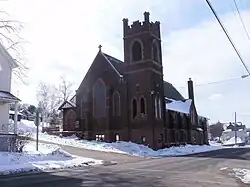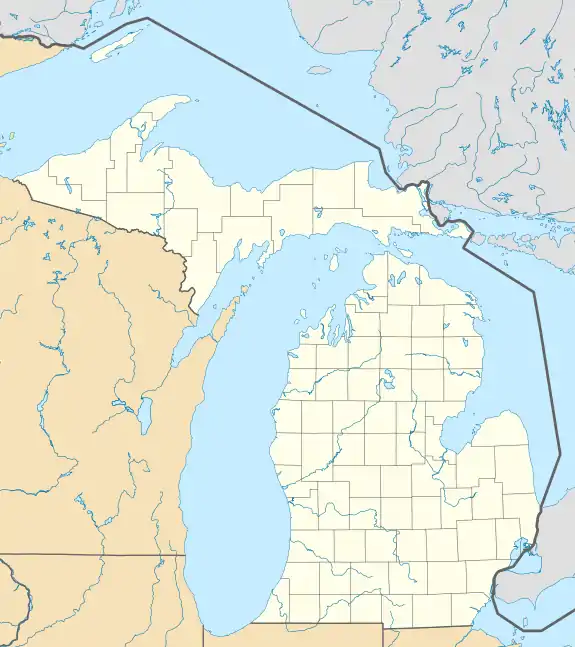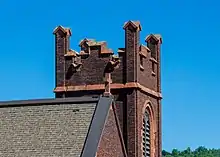| Trinity Episcopal Church | |
|---|---|
 Church in March 2012 | |
| Location | 205 East Montezuma Avenue Houghton, Michigan[lower-alpha 1] |
| Coordinates | 47°07′16″N 88°34′16″W / 47.121°N 88.571°W |
| Built | 1906-1910[1] |
| Architect | John Sutcliffe |
| Architectural style(s) | Gothic Revival |
| Governing body | Private |
| Designated | July 17, 1986 |
 Location of Trinity Episcopal Church in Michigan | |
Trinity Episcopal Church is a Gothic Revival-style Episcopal church at 205 East Montezuma Avenue in Houghton, Michigan.[2][lower-alpha 1] It was designated a Michigan State Historic Site on July 17, 1986. It is the second of two church buildings to exist on the site; the current one replaced a wooden structure in 1910. The church's philosophy is built on the Oxford Movement.[3]
History
The parish was founded on July 17, 1860, when the Episcopal Bishop of Michigan, Reverend Samuel A. McCoskry,[lower-alpha 2] met with nine businessmen from Houghton and Hancock.[1] The first clergyman sent to serve the church, upon arriving in Houghton on a Saturday, immediately departed on the vessel that had carried him.[4] Public services were first held on September 15, 1860.[1] The name Trinity Church was chosen at the first vestry meeting, held on July 13, 1861.[1]
The church's first permanent home was a wooden building across the Portage Canal in Hancock,[3] built on land donated by the Quincy Mining Company.[4] However, it was soon decided that the structure would be moved to Houghton, on land owned by Shelden, a member of the church.[3] The church was placed on a barge overnight, but it came free of its bounds and was found floating free in the morning.[3] It was successfully recovered and transferred to Houghton, where it remained until 1910.[3]
The wooden church was demolished in early 1910 to make way for the current church, built of brick and Jacobsville Sandstone, which was completed on Easter that same year.[1] In 1995, a two-story addition was built to house the pastor's office.[3] The current church was designated a Michigan State Historic Site on July 17, 1986, and an informational marker was erected on April 24, 1987.[1]
Architecture

The church is a brick structure built in the Gothic Revival style.[1] The basement façade, copings, and trim are all made of Jacobsville Sandstone.[1] The building has a square tower at one corner capped with crenellations.[1]
The building architect was John B. Sutcliffe and interior artwork and carvings were done by Alois Lang.[1] The interior design of the church was influenced by the Oxford Movement.[1] The roof's wooden trusses are exposed as arches that span the nave.[1] The church houses an Austin Organ, opus 419,[5] which was installed in 1913.[6]
See also
Notes
References
- 1 2 3 4 5 6 7 8 9 10 11 12 13 14 Staff. "Trinity Episcopal Church". State Historic Preservation Office. Michigan State Housing Development Authority. Archived from the original on January 2, 2014. Retrieved January 7, 2012.
- ↑ "Home". Trinity Episcopal Church Houghton. Retrieved January 7, 2012.
- 1 2 3 4 5 6 Neese, Garrett (August 7, 2010). "Trinity Episcopal Church celebrates 150th anniversary". The Daily Mining Gazette. Archived from the original on March 4, 2016. Retrieved January 7, 2012.
- 1 2 "History of Trinity Episcopal Church". Trinity Episcopal Church Houghton. Retrieved January 7, 2012.
- ↑ "Austin organ at Trinity Episcopal Church". Trinity Episcopal Church Houghton. Archived from the original on May 9, 2008. Retrieved January 7, 2012.
- ↑ Staff (January 14, 2012). "Recital Features Performance on Historic Church Organ". The Daily Mining Gazette.